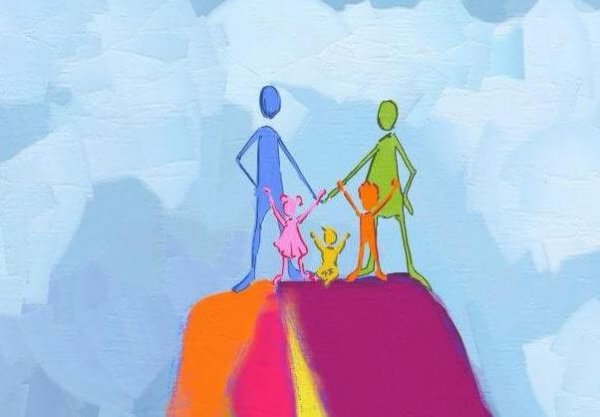Parenting and Love Go Hand in Hand

Parenting and raising a family are two of the most wonderful and magical challenges that life can present us with. Why? Because from the very beginning, children become a parent’s greatest treasure.
Parenting and loving are two verbs that go hand in hand. Most parents, from a profound and unconditional love, share their thoughts and emotions with their children, rediscover life, explore the world, and help the family to evolve with noble values.
It’s fair to say that being a parent isn’t easy. Despite the adventure of raising kids, raising them with love and positive values is a colossal task.
“You will teach them to fly, but they won’t fly your flight. You will teach them to dream, but they won’t dream your dream. You will teach them to live, but they won’t live your life. But in every flight, every life, every dream, the path that you taught will leave its mark.”
-Mother Theresa of Calcutta-

Our lights and our shadows are cast within our familial conditions. Therefore, psychologist Kenneth Kaye was certainly correct when he said that “parents instinctively do many things which help an infant emit behaviors that are actually beyond the capability of the infant alone. Infant development continues to unfold and progress within a context in which the infant is an apprentice to the parents.”
Being a parent usually involves worrying and learning to play the role in the best way possible. This involves strengthening our personal and communicative abilities as both as parents and people. This junction of roles requires us to give our children an emotional education from the very beginning.
Emotional education starts from birth, because the way parents convey their affection, expectations, and beliefs about the child determines how they’ll develop. The first few years of life are decisive for many reasons:
- In the first two years of life, the most notable influence on a child is the establishment of basic security, which is ultimately transmitted through physical contact and affection towards the child.
- After the first two years, another key aspect becomes part of the child’s emotional education: language. Its apparition and evolution allows them to put words to behaviors, ways of being, feelings, and thoughts. This milestone is a clear line between two different stages of development.
- This is the time when children become expert emotional explorers and constantly seek the attention of their parents in the form of approval, which leads them to organize, understand, predict, and deal with the world and themselves.

The 5 pillars of emotional education
For the proper emotional education of your child, you should pay attention to these five pillars, at the very least:
- Support through words and actions. Communicating properly, sincerely, and emotionally with your family is one of the key ways to sustain good relationships with your children. Whether they’re still kids or becoming adults, it’s important to be consistent and analyze your behavior.
- Emotional self-knowledge. If you want your children to be captivated by emotions, you should show that you are emotionally well-adjusted. You can only do this if you’re clear about which emotions are healthy and which aren’t. Remember that you have to offer them resources for the adequate understanding and management of their emotions.
- Manage your emotions. Be aware of your thoughts, confront disagreements assertively, and manage stress and tension with the kind of emotional intelligence that sustains a healthy and happy family.
- Be calm and conciliatory. Trust and conciliation allow us to see each other as a family even with all our differences. Reinforcing empathetic and interpersonal communicative abilities will help you to properly manage diverse problems and conflicts.
- Promote eagerness to understand the world of emotions. Exploration and curiosity are the basis for any good education. Through exploration and knowledge of different things, you reinforce having an open mind that’s free from prejudice and stereotypes.
- Respect and emotional validation. We should recognize that, like Carl R. Rogers said in his book On Becoming a Person, we’re not aware of the tremendous pressure that we put on the people we love to feel the same as we do. Often, the way we speak and act seems to say, “if you want me to love you, you should feel the same as me. If I think your behavior is bad, you should feel the same. If I think a certain goal is desirable, you should feel the same.”

Perfect parents don’t exist, but there are many ways to be a good parent
Being a perfect parent 24 hours a day, 365 days a year would be a Herculean task. That’s why we should be honest and admit that everything is not always wonderful and there is no ideal prototype that should guide us.
Through direct or indirect experience, we all know that the important thing for parents isn’t to be without imperfections or insecurities, but rather to give their children the opportunity to live in a balanced, enriching, and emotionally intelligent world.
That’s why there’s no magical formula, but there is an ingredient that all good educational principles share: endless love. Love is what makes parenting so amazing, and it guarantees that parents are capable of offering the best version of themselves as caregivers.
Illustrations courtesy of Claudia Tremblay and Víctor Rivas Fernández
Parenting and raising a family are two of the most wonderful and magical challenges that life can present us with. Why? Because from the very beginning, children become a parent’s greatest treasure.
Parenting and loving are two verbs that go hand in hand. Most parents, from a profound and unconditional love, share their thoughts and emotions with their children, rediscover life, explore the world, and help the family to evolve with noble values.
It’s fair to say that being a parent isn’t easy. Despite the adventure of raising kids, raising them with love and positive values is a colossal task.
“You will teach them to fly, but they won’t fly your flight. You will teach them to dream, but they won’t dream your dream. You will teach them to live, but they won’t live your life. But in every flight, every life, every dream, the path that you taught will leave its mark.”
-Mother Theresa of Calcutta-

Our lights and our shadows are cast within our familial conditions. Therefore, psychologist Kenneth Kaye was certainly correct when he said that “parents instinctively do many things which help an infant emit behaviors that are actually beyond the capability of the infant alone. Infant development continues to unfold and progress within a context in which the infant is an apprentice to the parents.”
Being a parent usually involves worrying and learning to play the role in the best way possible. This involves strengthening our personal and communicative abilities as both as parents and people. This junction of roles requires us to give our children an emotional education from the very beginning.
Emotional education starts from birth, because the way parents convey their affection, expectations, and beliefs about the child determines how they’ll develop. The first few years of life are decisive for many reasons:
- In the first two years of life, the most notable influence on a child is the establishment of basic security, which is ultimately transmitted through physical contact and affection towards the child.
- After the first two years, another key aspect becomes part of the child’s emotional education: language. Its apparition and evolution allows them to put words to behaviors, ways of being, feelings, and thoughts. This milestone is a clear line between two different stages of development.
- This is the time when children become expert emotional explorers and constantly seek the attention of their parents in the form of approval, which leads them to organize, understand, predict, and deal with the world and themselves.

The 5 pillars of emotional education
For the proper emotional education of your child, you should pay attention to these five pillars, at the very least:
- Support through words and actions. Communicating properly, sincerely, and emotionally with your family is one of the key ways to sustain good relationships with your children. Whether they’re still kids or becoming adults, it’s important to be consistent and analyze your behavior.
- Emotional self-knowledge. If you want your children to be captivated by emotions, you should show that you are emotionally well-adjusted. You can only do this if you’re clear about which emotions are healthy and which aren’t. Remember that you have to offer them resources for the adequate understanding and management of their emotions.
- Manage your emotions. Be aware of your thoughts, confront disagreements assertively, and manage stress and tension with the kind of emotional intelligence that sustains a healthy and happy family.
- Be calm and conciliatory. Trust and conciliation allow us to see each other as a family even with all our differences. Reinforcing empathetic and interpersonal communicative abilities will help you to properly manage diverse problems and conflicts.
- Promote eagerness to understand the world of emotions. Exploration and curiosity are the basis for any good education. Through exploration and knowledge of different things, you reinforce having an open mind that’s free from prejudice and stereotypes.
- Respect and emotional validation. We should recognize that, like Carl R. Rogers said in his book On Becoming a Person, we’re not aware of the tremendous pressure that we put on the people we love to feel the same as we do. Often, the way we speak and act seems to say, “if you want me to love you, you should feel the same as me. If I think your behavior is bad, you should feel the same. If I think a certain goal is desirable, you should feel the same.”

Perfect parents don’t exist, but there are many ways to be a good parent
Being a perfect parent 24 hours a day, 365 days a year would be a Herculean task. That’s why we should be honest and admit that everything is not always wonderful and there is no ideal prototype that should guide us.
Through direct or indirect experience, we all know that the important thing for parents isn’t to be without imperfections or insecurities, but rather to give their children the opportunity to live in a balanced, enriching, and emotionally intelligent world.
That’s why there’s no magical formula, but there is an ingredient that all good educational principles share: endless love. Love is what makes parenting so amazing, and it guarantees that parents are capable of offering the best version of themselves as caregivers.
Illustrations courtesy of Claudia Tremblay and Víctor Rivas Fernández
This text is provided for informational purposes only and does not replace consultation with a professional. If in doubt, consult your specialist.







